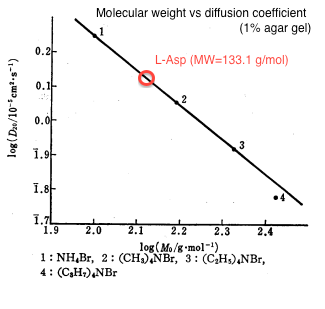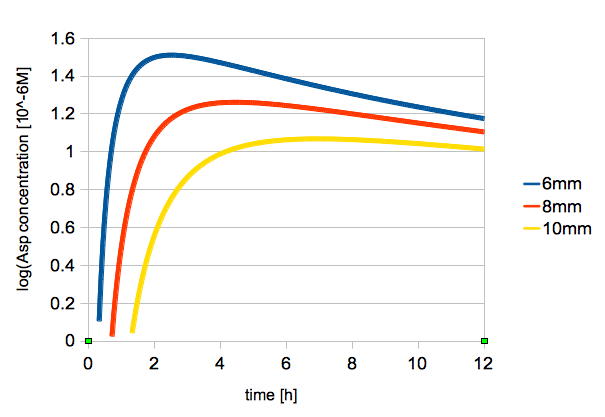Team:UT-Tokyo/Data/Modeling/Model01
From 2011.igem.org
| Line 7: | Line 7: | ||
=Method= | =Method= | ||
| - | We | + | We estimated the value of diffusion coefficient by interpolating molecular mass of L-Asp (133) from the relationship between molecular weight and diffusion constant as shown in figure 1<html><sup class="ref">[1]</sup></html>. |
{{:Team:UT-Tokyo/Templates/Image|file=utt_m1_fig1.png|caption=Figure 1. Molecular Weight v.s. Diffusion Constant}} | {{:Team:UT-Tokyo/Templates/Image|file=utt_m1_fig1.png|caption=Figure 1. Molecular Weight v.s. Diffusion Constant}} | ||
The estimated value was D = 0.001 [<html>mm<sup>2</sup>/sec</html>]. | The estimated value was D = 0.001 [<html>mm<sup>2</sup>/sec</html>]. | ||
| - | + | We used 0.25% agar gel in our experiment and according to a paper<html><sup class="ref">[2]</sup></html>, there is no practical difference of diffusion coefficient between 1% and 0.25% agar gel. | |
| - | + | ||
| - | + | ||
| - | + | ||
| - | + | ||
| - | + | ||
| - | + | ||
| - | + | ||
We simulated the time development of the L-Asp concentration distribution. | We simulated the time development of the L-Asp concentration distribution. | ||
| - | We | + | We simulated the diffusion equation using 1st order finite difference method. |
[[File:utt_m1_eqn1.png]] | [[File:utt_m1_eqn1.png]] | ||
| Line 33: | Line 26: | ||
{{:Team:UT-Tokyo/Templates/Image|file=utt_m1_fig2.png|caption=Figure 3. Change in L-Asp Concentration Over Time (2, 6, 8 mm from the center)}} | {{:Team:UT-Tokyo/Templates/Image|file=utt_m1_fig2.png|caption=Figure 3. Change in L-Asp Concentration Over Time (2, 6, 8 mm from the center)}} | ||
The time change of logarithmic values of L-Asp concentration at 2, 6, 8 mm from the center is shown in figure 3. | The time change of logarithmic values of L-Asp concentration at 2, 6, 8 mm from the center is shown in figure 3. | ||
| - | |||
| - | |||
| - | |||
| - | |||
<html> | <html> | ||
| Line 42: | Line 31: | ||
<div id="references"> | <div id="references"> | ||
<ul> | <ul> | ||
| - | <li id="ref_1">[1] Toshiko M, Masayuki N "measurement of diffusion coefficient using agar. gel" Chemical Society of Japan | + | <li id="ref_1">[1] Toshiko M, Masayuki N "measurement of diffusion coefficient using agar. gel" Chemical Society of Japan, 1978, 26, 5, 377</li> |
| + | <li id="ref_2">[2] W. Derbyshire, I. D. Duff "N.m.r of Agarose Gels" Chem. Soc., 1974, 57, 243-254</li> | ||
</ul> | </ul> | ||
</div> | </div> | ||
</html> | </html> | ||
{{:Team:UT-Tokyo/Templates/EndContent}} | {{:Team:UT-Tokyo/Templates/EndContent}} | ||
Revision as of 16:49, 5 October 2011
Model1: L-Asp diffusion

iGEM UT-Tokyo
Aim
We needed to know the behavior of L-Asp diffusion to perform our entire simulation (model3). We experimentaly researched Asp diffusion using TLC method but the results were insufficient for the entire simulation. So we decided to investigate the Asp diffusion by numerical simulation.
Method
We estimated the value of diffusion coefficient by interpolating molecular mass of L-Asp (133) from the relationship between molecular weight and diffusion constant as shown in figure 1[1].
The estimated value was D = 0.001 [mm2/sec]. We used 0.25% agar gel in our experiment and according to a paper[2], there is no practical difference of diffusion coefficient between 1% and 0.25% agar gel.
We simulated the time development of the L-Asp concentration distribution. We simulated the diffusion equation using 1st order finite difference method.
A indicates the L-Asp concentration and D means the diffusion coefficient. The shape of system was a circle with radius 5cm. We dropped 2×10-7 mol Asp at the center of the circle as the initial state.
Result
The time change of logarithmic values of L-Asp concentration at 2, 6, 8 mm from the center is shown in figure 3.
References
- [1] Toshiko M, Masayuki N "measurement of diffusion coefficient using agar. gel" Chemical Society of Japan, 1978, 26, 5, 377
- [2] W. Derbyshire, I. D. Duff "N.m.r of Agarose Gels" Chem. Soc., 1974, 57, 243-254
 "
"







